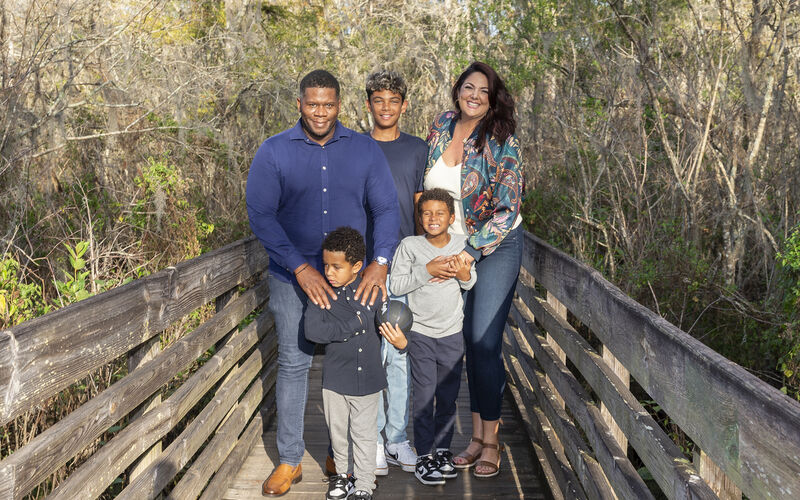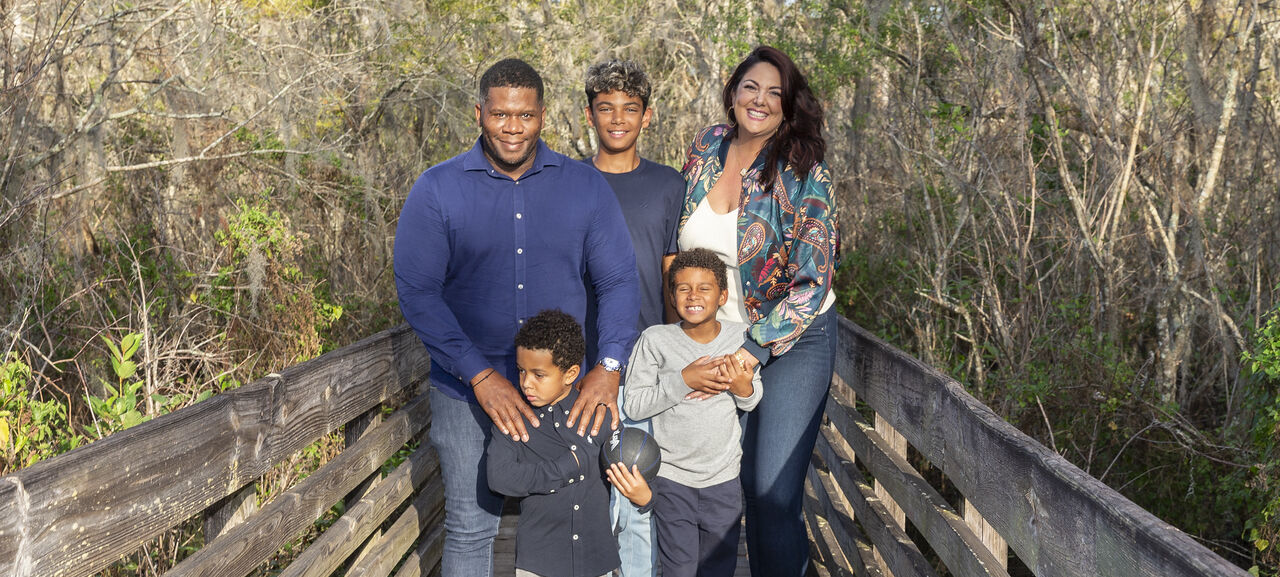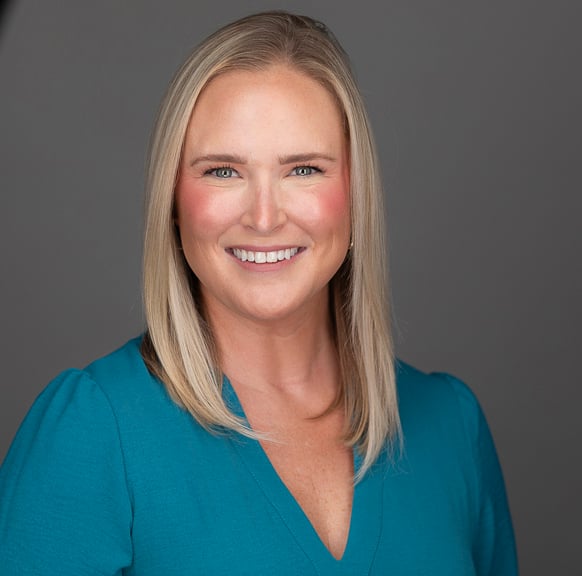A Father’s Fight for Family, Health and Advocacy
A child’s first birthday is more than a milestone for the baby — it is also a celebration for the parents. It marks a year of love and growth as a new family dynamic is formed. For the Jones family, January 2022 was meant to mark this happy occasion as they planned the first birthday party for their youngest son, Micah.
Family was gathering from out of town, balloons were prepped, and the cake was baked. The theme was Mickey Mouse, and silhouettes of the familiar ears decorated the walls of their Wesley Chapel home. But the day before the party, a nagging pain and a continuous feeling of nauseousness had been building in dad, Kendrix.
Kendrix was just 40 years old when he was diagnosed with stage 4 colon cancer.
He initially chalked up his discomfort to the flu, even trying prescribed nausea medication with no relief. But when Kendrix’s stomach began to swell, his wife, Carolynn, insisted he see the doctor again before the festivities began.
“My stomach was getting bigger, and I felt worse,” Kendrix said. “I told Carolynn I was just going to run back to the doctor, but she told me she was coming with me this time to make sure I wouldn’t sweep it under the rug or play it off like it was no big deal.”
What they thought would be a quick checkup turned into a life-changing whirlwind. The doctor’s concerns sent them to the emergency room. Within 45 minutes, scans revealed the source of Kendrix’s pain: a softball-sized mass on his colon. Confused and overwhelmed, Kendrix and Carolynn waited for the next steps as they tried to process the news.
“I remember it like it was yesterday,” Kendrix said. “They told me they have seen this before. They were going to get me into an emergency surgery, remove it, and hopefully, I would be back to normal. That was a relief. I thought we were going to deal with this for two days, have the surgery and get better.”
The next morning was supposed to be party day, but Kendrix was wheeled into surgery to remove the mass. Instead of singing “Happy Birthday” to Micah, his family waited for news from the hospital.
As Carolynn and her mom sat anxiously in the waiting room, the surgeon emerged. He was shaking his head. Carolynn’s heart sank. The mass was too large and had invaded nearby organs, making removal impossible.
“He looked at me, and he said it was too big, and they couldn’t get it out,” Carolynn recalled. “He said it was really dangerous and invading the pancreas.”
“So it’s cancer?” she asked.
The surgeon confirmed her fears.
Although they couldn’t remove the mass, doctors drained nearly 9 liters of toxins from Kendrix’s body, explaining he was days away from a tragic outcome. When Kendrix woke up, disoriented and feeling the unfamiliar colostomy bag on his abdomen, he learned the grim news.
On the day meant to mark a happy milestone in his youngest son’s life, Kendrix instead was facing an uncertain future. With three small children at home, the Jones family was forced to navigate a new reality they never saw coming. At 40 years old, Kendrix would be battling stage 4 colon cancer.
During his treatment, Kendrix drew strength from his loving family.
The doctor advised them to seek treatment at a cancer facility. Without hesitation, they turned to Moffitt Cancer Center.
Risks for Even the Young and Healthy
The news was baffling for Kendrix. Health had always been a priority. He grew up in Mount Dora, Florida, and stood out on the football field. Kendrix played in college, professionally in Europe and on the Chicago Bears practice squad before settling down with Carolynn and starting a family. Together, they had three boys: Isaiah, Major and Micah.
Just four months before his diagnosis, Kendrix had gone to the doctor for his annual physical. He requested a colonoscopy, aware that Black men face a higher risk of colon cancer. But at the time, his tests were normal, and his doctor told him he was too young for a routine screening.
“The doctor told me insurance would not approve it because the threshold to get a colonoscopy was 45. So they told me I was early, and it would likely be an out-of-pocket expense,” Kendrix said. “With no family history, I didn’t question it.”
Colon cancer doesn’t discriminate, but Kendrix’s case shows just how unexpected a diagnosis can be. Richard Kim, MD, is the service chief of medical gastrointestinal oncology at Moffitt and Kendrix’s oncologist.
Richard Kim, MD
“Kendrix is a perfect example,” Kim said. “He is a healthy guy, a football player, with no medical issues. Who would have thought this guy? But he is an example where it could happen to anyone.”
Current guidelines from the American Cancer Society recommend that people with an average risk of colon cancer start screenings at age 45. However, for many younger people, especially in the Black community, symptoms often go unnoticed or are dismissed.
Kim stresses that younger patients with symptoms like changes in bowel habits, blood in the stool or abdominal pain should be taken seriously, even if they do not fit the traditional profile of a high-risk patient.
“If you have symptoms, in my opinion, you’re never too young to get a colonoscopy. If you have blood in your stool, don’t ignore it. I would do the full workup. I know it’s not easy, but it’s worth it,” Kim said. “Detection is the key here. If you detect it, you could be cured.”
In the months that followed his physical, Kendrix felt strong, keeping up with three young boys with no signs of cancer growing inside of him. Kendrix was even in the middle of a 100-day running challenge, completing 2 miles a day until the day before he went to the emergency room.
“I stopped at day 57,” Kendrix said. “That is when I got sick, and everything changed.”
Finding Strength in Little Wins
Six weeks after his initial surgery, Kendrix began chemotherapy at Moffitt. The lifetime athlete approached the treatment with determination but admitted he was anxious.
“I wasn’t scared of losing my hair,” Kendrix said. “I was scared of becoming weak.”
One evening, hooked up to a chemotherapy pump at home and drained from treatment, Kendrix told his son Major he was too tired to pick him up. “But you’re strong, Dad,” Major insisted. Touched by his son’s belief in him, Kendrix found the energy to lift him — a small act that became a turning point in his fight.
“I’m crying and hugging him, thanking Major so much,” Kendrix said. “In his mind, he was helping me, and that was another moment where I’m like, here’s another win. I’m going to get through it.”
After four months and six rounds of chemotherapy, it was time to remove the mass from Kendrix’s colon. The surgeon estimated it would take two to three hours, but complications arose. Scar tissue from the previous surgery and other issues turned it into a 13-hour operation.
“I remember waking up and asking the surgeon, ‘How was it? What time is it?’” Kendrix recalled. “He told me, ‘It’s 9:50.’ I thought, ‘Great, two hours, right on time.’ But then he said, ‘It’s 9:50 p.m.’”
The surgery involved removing Kendrix’s spleen, part of his pancreas and the tumor. Despite the challenges, his medical team remained steadfast. It was a testament to their expertise and dedication.
“They fought for me every step of the way,” Kendrix said. “I could have gone to a different place with a different result, but this was Moffitt. They never gave up.”
Unequal Burden of Colon Cancer
Kendrix’s story reflects a troubling reality: According to data from the American Cancer Society, Black Americans are 20% more likely to be diagnosed with colorectal cancer and 40% more likely to die from it than other groups. Colorectal cancer is also rising among young adults, especially in the Black community.
“Unfortunately, despite improvements in screening and treatment for colorectal cancer, Black individuals are still more likely to develop and die from this disease,” said Doratha Byrd, PhD, a researcher in Moffitt’s Cancer Epidemiology Program.
Byrd explains that disparities in cancer outcomes for the Black community are rooted in a complex web of factors, including psychosocial factors like stress, limited access to healthy food and socioeconomic challenges. However, she emphasizes these issues alone do not explain the whole picture.

Doratha Byrd, PhD
“For example, we did a study of outcomes among colorectal cancer patients seen at top cancer hospitals in the U.S. and still found poorer survival outcomes among Black individuals compared to other racial and ethnic groups, even after accounting for treatment and stage at diagnosis,” Byrd said.
Her current research explores whether the gut microbiome — a collection of trillions of microbes in the digestive system — may contribute to colorectal cancer risk among different communities. Recent studies suggest that the gut microbiome and the microbes within tumors may influence how patients respond to cancer treatment.
“Diet likely has a huge impact on the composition of the microbes in the gut. So far, there are several examples of how diet can potentially change the gut microbiome even within a short time frame, such as when making a drastic switch between animal-based and plant-based diets.”
While research continues, one thing remains clear: Early screenings and healthy habits can save lives.
Turning Wins Into Action
After his surgery, Kendrix received six more rounds of chemotherapy before he was declared cancer free. In March 2025, he celebrated three years in remission, and now he’s making it his mission to educate the community about cancer.
“I just want to be an advocate to people because I know the importance of support,” Kendrix said. “It touches so many families, and if I help give that family a bit of peace and motivation to fight, that’s what I want to do.”
Kendrix uses his platform on social media and at events to inspire others to take charge of their health and to break the silence around cancer. He encourages people to become their own health advocate and reminds them it’s OK to talk openly about their disease.
In March 2025, Kendrix and his family celebrated three years in remission. Now, he is focused on raising awareness.
The family’s message is also continuing to spread throughout the Tampa Bay area. The Jones Family Foundation, a nonprofit founded by Kendrix and Carolynn, is dedicated to mentoring children and supporting underserved communities.
“It’s healing for him,” Carolynn said. “It shows the power of advocacy and people like Kendrix being in the community. He lights up now when he talks about it and knowing he is helping. The hardest thing is to initiate a conversation, but if someone’s willing to talk to someone about it, it may help them get to the next phase of that journey.”
By turning his struggle into purpose, Kendrix proves that surviving cancer is more than a personal win — it’s a chance to save lives. And he has advice for all those pushing forward in their own journeys:
“Even after you go through these things and you win, the ‘what-ifs’ are always on your mind, but just remain positive and look at what’s in front of you.”
This article originally appeared in Moffitt's Momentum magazine.








